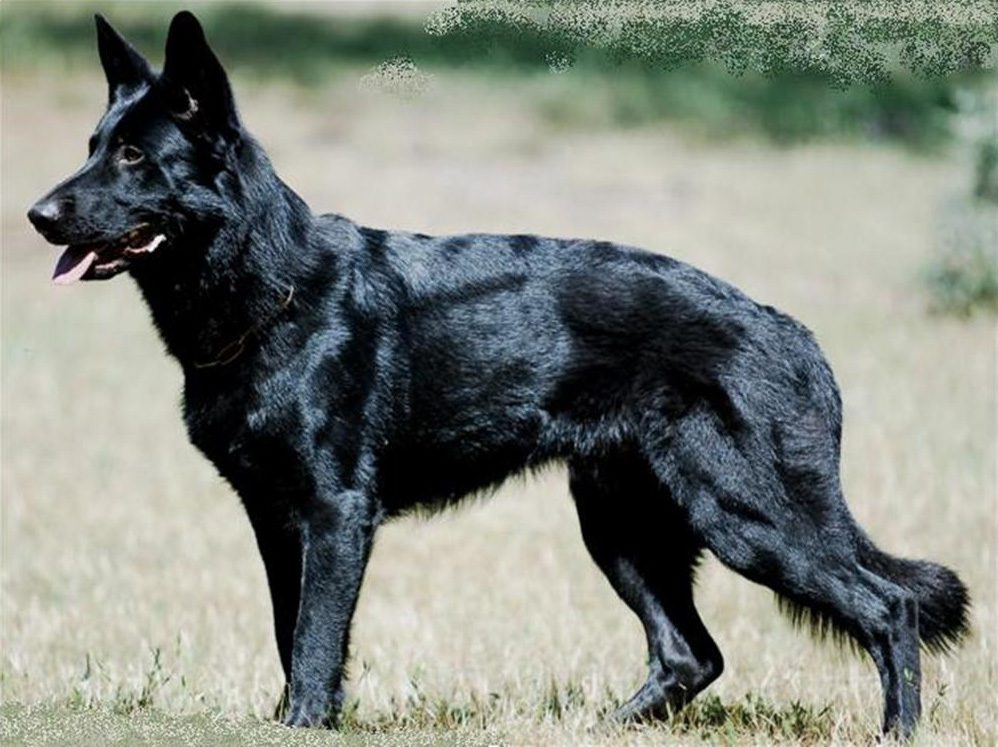Dog breeds have long been valued for their unique traits and abilities, with some breeds being specifically sought after for their protective instincts and loyalty.
When it comes to home security, many people wonder how different dog breeds react to robbers and intruders.
In this article, we’ll delve into the various responses of popular dog breeds when faced with potential threats and explore the factors that contribute to their behavior.
How Dog Breeds React To Robbers?

German Shepherds

When it comes to robbers or intruders in the home, German Shepherds will bark and alert their owners of any danger.
They may even go as far as to respond aggressively and attack if they feel threatened. German Shepherds are trained to protect their families from harm.
So, it is important that these dogs are properly socialized from a young age in order to ensure that they can handle certain situations calmly and appropriately.
It is also essential for owners to provide ongoing obedience training so that the dog understands commands, such as “back off” or “let go” when facing a potentially dangerous situation with an intruder.
Rottweilers

If a robber were to enter the home, the Rottweiler is likely to bark aggressively and may even attack if it feels threatened.
They are instinctual guard dogs, so they will act according to their natural instincts in this scenario.
It is important that Rottweilers receive proper training so that they can differentiate between intruders and everyday visitors without attacking unnecessarily.
With the right training, they can provide a great level of protection for your home and family against unwanted guests.
Doberman Pinschers

Doberman Pinschers respond to potential threats with a deep, intimidating growl that can be enough to ward off any intruder.
Depending on the situation, they may also bark or lunge at an intruder in order to keep them away from their owners and property.
Dobermans will not hesitate to attack if necessary. They have been known to bite or even kill criminals if they sense danger.
This is why it is important for anyone owning a Doberman Pinscher to properly train and socialize them. With proper training, these dogs are loyal protectors who will do whatever it takes to keep their owners safe from harm.
Boxers
Boxers have a strong instinctive reaction to strangers who enter their homes or territory. They can sometimes react aggressively when faced with an intruder.
It is important for owners of Boxer dogs to be aware of this natural tendency and to train their pets properly.
A well-trained Boxer will respond calmly to most intruders. But, if the situation requires it, they are capable of intimidating and even attacking potential robbers.
With proper training, Boxers can be taught to sound an alarm bark when someone enters the house or property, alerting them that there is an intruder present.
Belgian Malinois
Belgian Malinois have strong guarding instincts and are often used as guards and working dogs. They may bark aggressively at an intruder or attempt to physically restrain them.
In fact, Belgian Malinois can be very intimidating when provoked, making them excellent deterrents against potential burglaries.
However, it is important to remember that these dogs should always be trained and monitored appropriately so that their aggression is directed only at actual threats and not people they do not recognize.
Bullmastiffs
Bullmastiffs are known for their strong territorial instincts and loyalty to their family. When a Bullmastiff senses that its territory is being invaded, it will bark loudly to alert its owners of the intruder’s presence.
If the intruder persists, the Bullmastiff may become more aggressive and attempt to intimidate them with deep growls and an imposing stance.
In extreme cases, they may even try to physically restrain the intruder until help arrives.
With their sturdy bodies and powerful jaws, Bullmastiffs are well-equipped to take on any potential burglar or robber.
Akita
Akita is very protective of their home and family. They have an instinctive sense to guard the house against intruders and will alert their owners if someone is trying to break in.
Akita can be quite intimidating when they feel threatened, barking loudly and standing their ground with a firm stance.
They may even lunge or bite if necessary, making them effective at deterring would-be robbers. Of course, it’s always best to train your Akita properly so that it does not attack unnecessarily.
Staffordshire Bull Terriers
Staffordshire Bull Terriers are loyal and protective dogs, so they can prove to be very effective in deterring robbers.
They will bark loudly at any intruders that enter their home, alerting the owners to danger. Their muscular body structure also gives them a menacing look which may intimidate potential burglars from attempting a burglary.
The breed is naturally brave and courageous, ready to stand up for their family when needed. While they rarely attack out of aggression, they won’t hesitate to use force if necessary.
Rhodesian Ridgebacks
If a robber or intruder were to enter your home, a Rhodesian Ridgeback wouldn’t hesitate to protect its family.
These dogs can bark loudly to alert you of the danger, and will likely even attempt to corner the intruder until help arrives.
It’s important that these large and powerful dogs receive proper training and socialization from an early age, as they could otherwise become aggressive if provoked or scared.
Kuvasz
Kuvasz has a strong natural protection instinct and makes excellent guard dogs. They will not hesitate to protect their family from danger, even if it means putting themselves in harm’s way.
A Kuvasz’s reaction to a robber or intruder depends on its training, but the breed is known for its courage and loyalty.
If an intruder were to enter the home of a Kuvasz, they may confront them with barking and aggression or by physically restraining them until help arrives.
Chihuahuas
Chihuahuas are surprisingly good at detecting danger and can act as effective alarm systems.
Even if the burglar manages to get inside, Chihuahuas will be quick to react with a loud bark and alert you of any potential danger.
They may even become aggressive and try to attack the burglar in an attempt to protect their home.
Although small, they can be fierce defenders and many robbers have been known to flee when faced with an angry Chihuahua!
If a robber does manage to stay put, then Chihuahuas will continue barking until you arrive or help is called.
Pomeranians
Pomeranians are alert and loyal dogs that make excellent watchdogs. They will often bark to alert you of a stranger’s presence or an unfamiliar noise.
When it comes to a potential robbery, Pomeranians will react fiercely with their loud barking in an attempt to ward off the intruder.
If pushed further, they may even become aggressive and try to scare the robber away by biting or charging at them.
Although these dogs are small, their courage and determination can be quite intimidating for any burglar.
Yorkies
Yorkies are a brave breed of dog. They are alert to their surroundings and may bark at strangers or unusual sounds, which can be an effective warning.
Yorkies are also known for being loyal and protective of their people. If they sense danger or believe their family is being threatened, they may become aggressive toward the intruder.
If confronted by a robber, a Yorkie could bark incessantly or even bite the perpetrator in order to protect its family.
Beagles
Beagles are generally very loyal and protective of their owners, so they may bark and growl at someone who appears threatening.
They are also highly alert and attentive to their surroundings, making them good watchdogs.
If someone does manage to enter the home, beagles will likely become aggressive in an attempt to protect their family. They may bark loudly or even try to bite the intruder if they feel threatened.
Cocker Spaniels
When faced with an intruder, they will bark vigorously in an attempt to scare them away or draw attention from you or a neighbor.
They may also become aggressive if the situation intensifies.
It is important to train them early on proper safety measures when it comes to strangers entering your home. Teach them commands such as “down” and “stay” so they can be more manageable in these situations.
Golden Retrievers
Golden Retrievers are loyal and protective of their owners, so they would likely bark at any intruder who enters a home.
They may also become aggressive towards the robber if they sense danger or feel threatened.
Golden Retrievers will often try to defend their family as much as possible; however, it is important that they be trained in proper obedience and kept on a leash in order to ensure safety for all involved.
Great Danes
Great Danes are devoted guardians of their families and will usually bark to alert the owner of any intruders.
They can be very intimidating when it comes to strangers, making them a great deterrent for burglars.
Though they may not attack a robber, they can put on an impressive display that could easily scare away someone who was thinking of breaking in.
Great Danes can also sense danger and protect their families if needed. They can be trusted to act appropriately if there is ever a break-in.
Labradors
Labradors typically make poor guard dogs due to their outgoing, friendly nature and lack of aggression.
However, if a person enters their home uninvited or makes an aggressive move toward them or their owner, Labradors can become alert and bark to warn the intruder.
They may also growl or even snap in defense if they feel threatened.
Labradors are likely to follow up any warnings with attempts to drive off the intruder by barking and chasing them away.
A Labrador may bite an intruder if it feels its safety or that of its owner is threatened.
Do Dogs Scare Away Robbers?
Yes. Studies have shown that the presence of a dog can reduce burglary rates in some circumstances although the effectiveness varies depending on the breed and size of the canine in question.
It’s also important to note that having a guard dog doesn’t guarantee protection from intrusion or theft. Any burglar who is determined enough will find ways to get past even an intimidating pup.
Do Dogs Stop Robberies?
No, dogs cannot stop robberies. They can be trained to alert owners or guardians of potential danger. However, they are not capable of physically preventing someone from carrying out a robbery.
Some people may believe that having a dog around could deter robbers. But, there is no guarantee that it will work.
Additionally, some robbers may actually target homes with pets because they know the owner is less likely to put up a fight.
For this reason, it’s important to take extra precautions such as installing an alarm system and ensuring all doors and windows are locked when leaving the house.
FAQs
1. Do all dog breeds react the same way to robbers?
No, different dog breeds may have different reactions to robbers. Some breeds may be more instinctively protective of their owners and property, while others may be more easily spooked or uninterested. It is important to research a breed’s temperament and traits before getting a dog for protection purposes.
2. What breeds are known for their protective tendencies?
Some breeds that are often recommended for protection purposes include German Shepherds, Rottweilers, Doberman Pinschers, and Bullmastiffs. However, each individual dog can have a different personality and reaction to different situations. So, it is important to work with a professional trainer to ensure the dog is properly trained and socialized.
3. Can small dog breeds also provide protection against robbers?
Small dog breeds may not have the size or strength of larger breeds. But, they can still provide a warning signal or alert their owners to suspicious activity. Breeds such as Chihuahuas, Jack Russell Terriers, and Yorkshire Terriers have a reputation for being vocal and protective of their owners.
4. Can dogs be trained to react in a certain way to robbers?
Yes, with proper training and socialization, dogs can be trained to react in a specific way to robbers or suspicious activity. Professional dog trainers can work with the dog and owner to develop a plan and train the dog to respond appropriately.
5. What are some signs that a dog recognizes a potential threat?
Some signs that a dog may recognize a potential threat include growling, barking, standing with their ears and tail up, and closely watching the person or activity. However, it is important to remember that some dogs may be more reactive than others and may need additional training or socialization.
6. Should I rely solely on my dog for protection against robbers?
No, it is important to take additional precautions such as securing doors and windows, installing a home security system, and practicing safety measures when out in public. While a well-trained dog can be an asset in deterring and alerting to suspicious activity, it is not a guarantee of safety.
7. How can I train my dog to react to robbers?
It is important to work with a professional trainer who has experience in training dogs for protection purposes. The trainer can assess the dog’s personality and develop a training plan that will help the dog respond appropriately to different situations. Consistency, positive reinforcement, and patience are key elements in training.
In Conclusion
Understanding the natural instincts and characteristics of each breed can help you determine which dog might be the best fit for your family and provide an additional layer of security for your home.





Leave a Reply